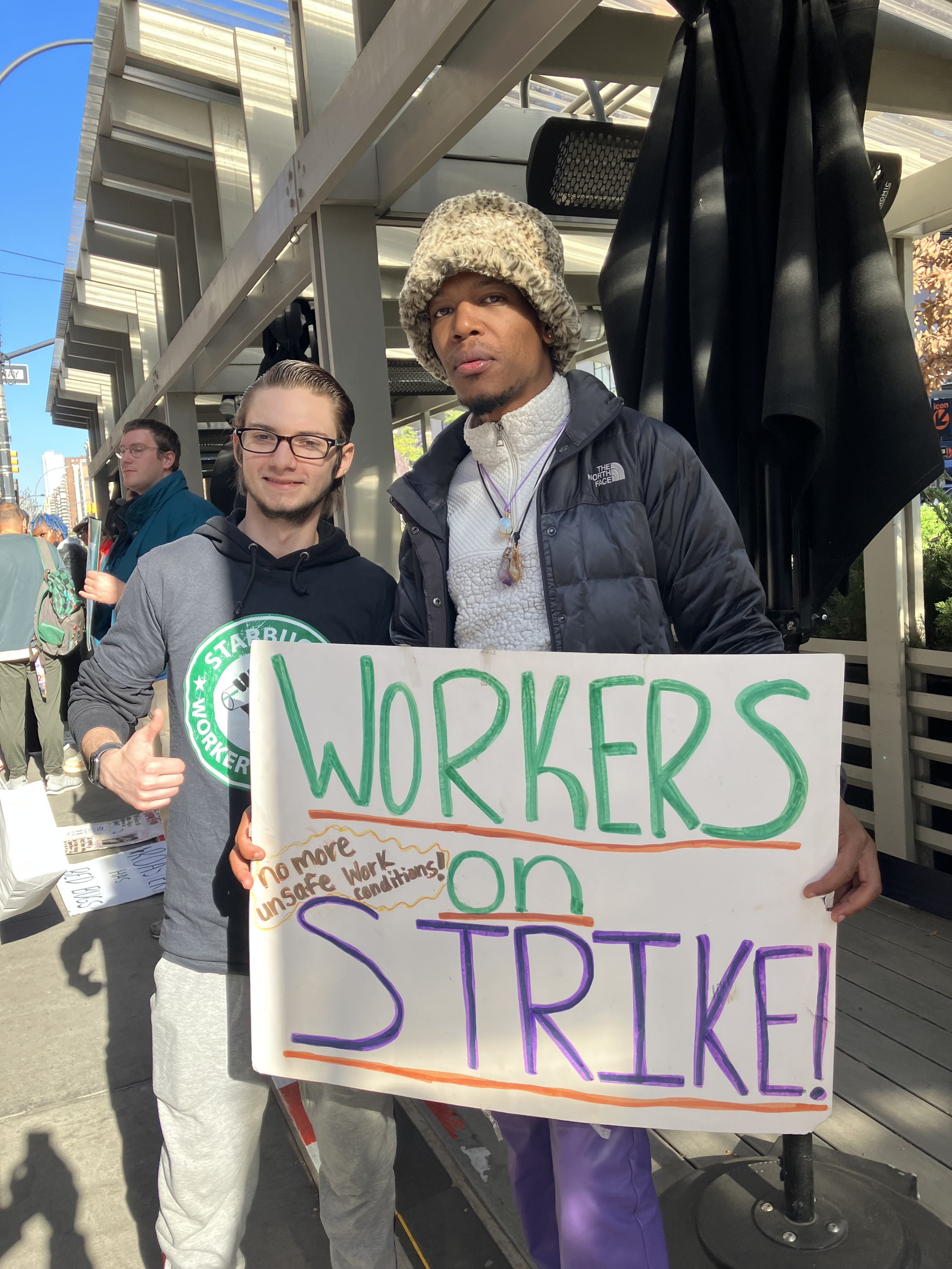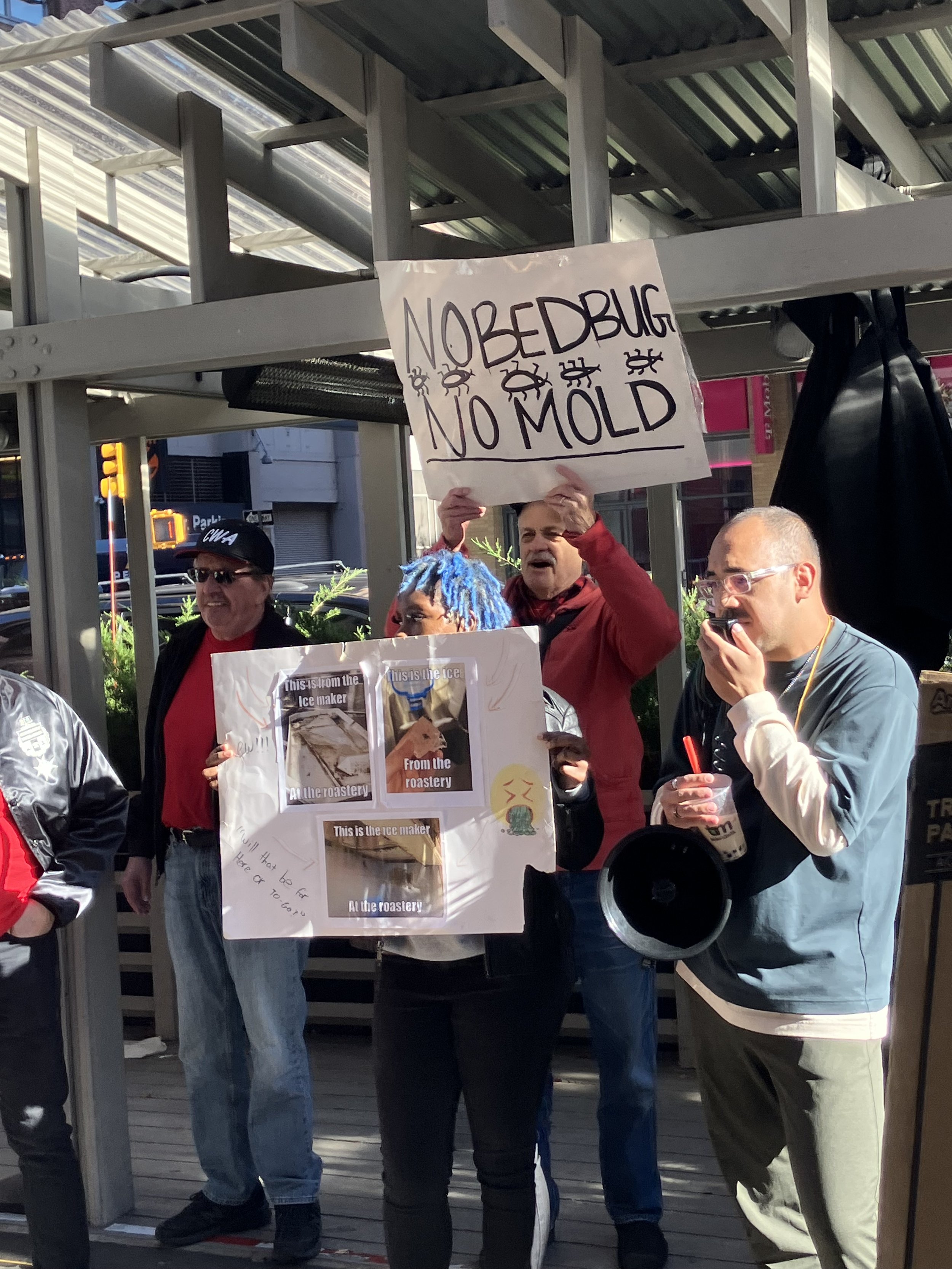Under Threat of Termination, Starbucks Workers Stand Strong in NYC
Starbucks workers Joel Foote and Trishton Brown are union strong outside the company’s Reserve Roastery in Chelsea. Photos by Joe Maniscalco
By Joe Maniscalco
Starbucks worker Joel Foote already had seven write-ups hanging over his head when Work-Bites talked to him outside the company’s Reserve Roastery in Chelsea this past Thursday. One more and he would be fired. “Fear is a tool of the boss,” the 24-year-old said. “The power lies within our labor — and once we understand that we don’t need to be afraid.”
Foote, is a California transplant who’s been in NYC for nearly five years. He still splits the rent with roommates just to get by. He and his Reserve Roastery co-workers successfully organized with Workers United back in April — but they still don’t have a collective bargaining agreement — no union contract.
A few weeks ago, a discovery of bedbugs and mold inside the flagship Starbucks store located at 61 Ninth Avenue in Manhattan sparked an employee walkout. Last Thursday marked Day 17 of that ongoing job action.
“It’s crazy,” 27-year-old Trishton Brown told Work-Bites as he helped man the picket line. “We didn’t get any notifications [about bedbugs]. I just got back to work and everybody’s stuff was in plastic bags. I though it was part of a locker clean out that they do annually — but I found out when I got on the floor it was bedbugs. They didn’t call or email us to give us the option to work or not.”
Starbucks workers, along with those at Amazon are amongst a group of workers in service-oriented industries throughout the country who are helping to infuse more life and vitality into the Labor Movement than has been seen in decades.
But as Work-Bites has already reported, all of that determined organizing and creativity has largely failed to produce good union contracts because of the way labor law in this country favors the bosses.
A 2008 study by the Massachusetts Institute of Technology’s Sloan School of Management, for instance, found that in the more than 8,000 workplaces where unions won elections between 1999 and 2004 — only 56% reached a first contract.
“I think the general goal here is we’re starting a precedent,” Foote told Work-Bites. “Starbucks is the biggest corporation by number of locations in the entire world. It’s got huge brand awareness and all these kinds of things. I think if we set the precedent right here for the greater Labor Movement — if we are able to fight and win a contract we set that precedent — and we’ll get a lot of these other big corporations scared and we’ll be able to change some of those laws to be in more favor of the workers.”
Generational Knowledge
Ellen Bravo and Larry Miller are lifelong union organizers and authors of Standing Up — the inspiring novelization of their half-century in the Labor Movement. Although existing laws are stacked against workers like Foote and Brown — they, too, are convinced increasing unionization will ultimately translate into real statutory changes in labor law.
“There will always be examples of people, despite the obstacles, getting through — and we’re seeing that,” Bravo recently told Work-Bites. “At the same time, there shouldn’t be the obstacles. There shouldn’t be all the people that are getting fired and losing so much during the course of this. But it’s because of those struggles that the laws will change.”
Starbucks workers at the corporation’s Reserve Roastery in Chelsea unionized back in April, but are still fighting for a contract.
According to Miller, we are actually seeing the emergence of a “new working class” — one consisting of low-wage, yet essential service-oriented workers — who can also beat the boss.
“It’s not an easy road,” he told Work-Bites. “They’re being challenged at every level. The attacks just keep coming. A lot of stuff is happening that the public is not fully aware of going on with that work. The struggle has to continue. If you don’t struggle, you don’t win. We have to continue this work and we have to continue this struggle — but in the long run, strategically, these laws have to change.”
Will To Win
In October, continuous agitation produced a legal win for workers at the Chelsea Starbucks in which management was forced to wipe out disciplinary actions from employees records.
Since then, however, Foote says more employees are being “written up” than ever before.
“Where previously we had no write ups — suddenly, we were getting hit with write ups from months ago — and a higher volume of them, too,” he said.
Originally from New Orleans, Brown only just recently started working at the Starbucks Reserve Roastery in Chelsea.
“This isn’ my first problem like this with a job,” he told Work-Bites, “but it is my first time doing something like this.”
“I feel we just need to do better,” he continued. “We work hard enough. These are like waiter jobs — without the tips. We’re not stopping until we get what we want.”
Foote said after “jumping from job to job every four months” workers like him and his colleagues have come to understand “working conditions everywhere are just way too unfair” and “the only way to combat that — is to stand up and fight back.”
“I started this year working two jobs just to make ends meet — everybody knows rent is high in the city,” Foote said as the sidewalk chants grew louder. “And I started to think…’I don’t deserve this.’ I know that I work hard enough and my labor should be valued at a much higher rate than it is. Now, we’re talking about health and safety concerns [at this store]. That should be the bottom baseline thing that should be taken care of. If nobody holds the management of all these big corporations accountable — then it will never change.”


